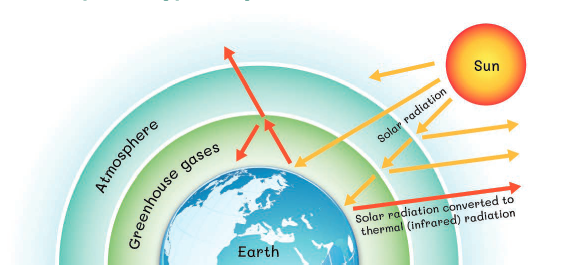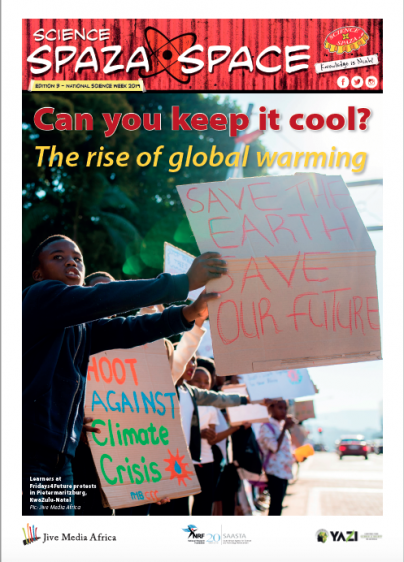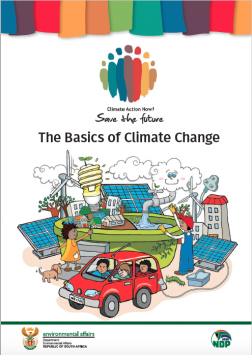We're getting ready for #SFSA2019!
That's right friends...we're heading to Science Forum South Africa (SFSA) 2019!
GET EXCITED!
This years theme is:
Igniting Conversations About Science For Innovation With Impact
The 2019 event will take place at the CSIR International Convention Centre from the 4th to 6th December 2019 and will showcase the latest in technology and innovation! Join us in igniting conversations about science and innovation in South Africa. Visit our table in the foyer for your free copy of Spaza Space! Come and engage with the team and find out how you can get involved!

What is Climate Change?
Climate change is different from changes in the weather. Weather can change from day to day and hour to hour, while climate is the average pattern of weather over a long time. Climate change is an alteration of the earth’s general weather conditions. The most prominent part of climate change is the rising temperature at the earth’s surface. Apart from increasing average temperature, climate change also includes changes in rainfall patterns and an increase in extreme weather events that lead to phenomena such as floods and droughts.
The Greehouse Effect
When the sun shines on Earth, some of its solar radiation (in the form of light energy) is reflected by Earth’s surface and the atmosphere. The rest of the solar radiation is absorbed by Earth’s surface and atmosphere and is converted to heat energy (infra-red radiation) that warms Earth. The infrared radiation is emitted from Earth’s surface again but not all of it escapes to outer space. Some of the radiation is absorbed and reemitted in all directions by greenhouse gas molecules. These gases act like a blanket that keep Earth’s surface and the lower atmosphere warm. This is called the natural greenhouse effect. Earth’s average temperature is 14°C, a comfortable temperature to sustain life. Without the greenhouse effect, so much infra-red radiation would be lost that Earth would be an icy -19°C. At these frigid temperatures, life as we know it would not be possible.

Greenhouse Gasses
The atmosphere is a layer of gases that surround Earth. These gases are mostly nitrogen (78%) and oxygen (21%). There are also smaller amounts of other gases present in the atmosphere. Among these gases are the greenhouse gases that are responsible for trapping the sun’s heat inside the atmosphere and keeping the planet warm. The most prominent greenhouse gases are water vapour (water in its gaseous phase), carbon dioxide, nitrous oxide and methane. When plants, animals and bacteria from long, long ago became fossilised, the carbon inside them became buried. Over the years, they turned into fossil fuels namely coal, oil and gas. Humans started burning large amounts of fossil fuels during the industrial revolution in the nineteenth century and this started releasing the ancient carbon back into the atmosphere. Humans have also been chopping down large forests, which reduces the Earth’s natural ability to absorb greenhouse gases. Agricultural practises, in particular, have increased the levels of methane and nitrous oxide in the atmosphere. With an increase in greenhouse gases, Earth loses less heat, causing warming of the planet. This warming effect is called global warming but it leads to various changes in climate all over Earth, even making some places colder.
Thank you to the Department of Environmental Affairs for partnering with us on this article
“Sjoe! This has got to be the hottest summer I have ever experienced, and mind you, I have been living here since I was born. I’m telling you – this climate change is bad.”
We all have conversations about the weather, mostly because a discussion on the weather is the perfect conversation starter and what better way is there to fill-up that awkward conversation gap, right? As normal as the weather may seem, everyone experiences it on a daily basis, and so a weather discussion can result in quite lively conversations. Nowadays, the term climate change is sure to pop up in casual conversations about the weather, directly related to the level of discomfort that someone is experiencing, and is generally used at the end of the conversation. One that no one can argue with. The grand finale to the weather discussion. In reality, while the term “climate change” has become quite popular in casual conversations, print media and social media, very few people actually understand the impact of climate change.
Climate change is about more than JUST the weather. For example, has it ever occurred to you that climate change may have a huge impact on your health? Possibly not; you may have had to think a bit about that one. So how does climate change affect your health? Extremes of temperatures are obviously not good, and with climate change causing an increase in the average global temperatures, it’s definitely going to become much warmer. Continuous exposure to hot conditions can result in many heat-related illnesses ranging from sunburn to heat exhaustion, heat cramps, and the dangerous sun stroke (or heatstroke). While these may happen to literally anyone, the very young, the very old, individuals with underlying medical conditions, those with weak immune systems, and those who do not have proper clothing and/or housing, are at a higher risk. Higher temperature also result in an increase in air pollution and pollen, which could trigger asthma and worsen other cardiovascular and respiratory diseases.
Believe it or not, temperature extremes can have effects on your mental health too, which may eventually affect your work and relationships. It already sounds pretty worrying right? Unfortunately, there’s more. There are many indirect health effects of climate change as well. Weather-related natural disasters are on the rise. An increase in droughts will lead to unreliable levels of food production, leading to hunger and famine. Increase in floods will lead to local devastation and disruption, with injuries and death, and affected individuals will be exposed to unclean water sources. This will lead to an increase in infectious water-borne diseases such as bilharzia. The recent cholera outbreak in Mozambique, following Cyclone Idai, is just one, close-to-home example.
Insect and snail populations are also sensitive to climate change. Increasing temperatures would mean a wider distribution of vector-borne diseases (diseases which cause human illnesses, caused by parasites, viruses and bacteria carried by insects) such as malaria which is carried by mosquitoes, and possibly an escalation in the number of people infected. So yes, climate change will definitely impact on health. According to the World Health Organisation, climate change will result in approximately 250 000 additional deaths per year, between 2030 and 2050. These would be as a result of heat stress, malaria, diarrhoea, and malnutrition.
So the next time you are having one of those well-known weather conversations, don’t forget about all the serious health effects of climate change. Try to steer the conversation to ways that we as individuals can impact climate change – waste less food, switch to a more plant-rich diet, save energy in our homes and using public transport are just some examples. The group effort of small changes can make a huge impact. Let’s do our part in the fight against climate change.
- Written by Sabeehah Vawda, SAASTA
Read the article and complete the crossword

Thank you to SAASTA for partnering with us on this feature.
Check out our latest edition of Spaza Space! This edition focuses on National Science Week and Climate Change. Go through this edition, read the articles and complete the fun activities.
Download the Climate Change booklet to learn all about about climate change.
Thank you to the Department of Environmental Affairs and SAASTA for collaborating with us on these resources!


We heated up the climate change conversation this year as we took to the streets with our fellow youth to demand climate change action!
Learners from 3 schools in Pietermaritzburg, St. John’s DSG, Maritzburg College and Slangspruit Primary School, put together song and dance performance pieces to express their concerns about our future. They collaborated with researchers, musicians and choreographers to create song and dance performances, and partnered with the PMB Climate Crisis Coalition (PMB CCC) to host a series of events during National Science Week, an initiative of the Department of Science and Technology. The theme this year was “facing the harsh realities of climate change”.
Hip Hop Science Spaza created an opportunity for young people to explore how climate change impacts their daily lives and circumstances. Learners met with researchers from the University of KwaZulu-Natal, Research Chair in Waste and Climate Change and team members from the uMngeni Resilience Project to better understand climate science, and to develop songs through which to share what they had learned. They were also featured on television programme Hectic Nine-9. Be sure to catch their feature above.
The learners wrote their hip and happening songs after interviews with the researchers, and they recorded their HOT tracks! Then, in association with local dancer and choreographer Bonwa Mbontsi, they created a dance routine to perform at our final event!
Check out these cool cats!



Thank you to these organisations for collaborating with us!





